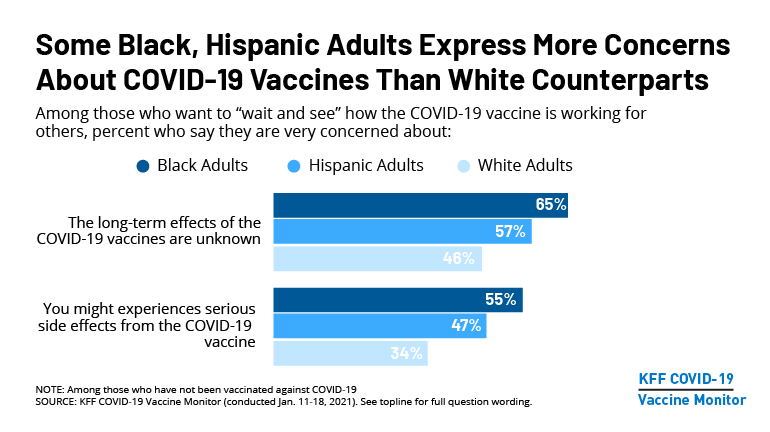This Week in Coronavirus: February 5 to February 11
Published:
Here’s our recap of the past week in the coronavirus pandemic from our tracking, policy analysis, polling, and journalism.
COVID-19 vaccine continues with signs of progress and also continuing challenges as reported by KHN. KHN also asked readers to share their experiences searching for vaccinations.
In his column, Drew Altman shows why vaccine hesitancy will naturally decrease as more and more people see their family members and friends vaccinated without adverse consequences. He writes, “As vaccine hesitancy diminishes, efforts can focus most on the groups most likely to be persistently vaccine resistant, including in the Black community and rural America.”
Vaccine Monitor reports that nearly a third of the public wants to “wait and see” how COVID-19 vaccines work before getting one, examining how this group’s views vary by party ID and race/ethnicity in ways that could influence effective messaging.
Earlier this week a report looked at the public’s response to a series of open-ended questions aimed at better understanding people’s concerns around receiving a COVID-19 vaccine — and the views of the messages and messengers that could affect their willingness to get one. It includes direct quotes from the more than 1,000 people interviewed. This and other COVID-19 Vaccine Monitor content is available via a dashboard.
A KFF analysis finds that most older adults have not yet been vaccinated against the potentially deadly virus in the states reporting this data, as vaccine supplies remain limited and most states have only recently begun to make people 65 and older eligible.
Meanwhile, a new map and tables show who is currently eligible to receive the COVID-19 vaccine in each state by the following categories:
- Age,
- People with High-Risk Medical Conditions,
- People Living in Congregate Settings,
- K-12 School Personnel,
- Law Enforcement and Public Safety Personnel,
- Correctional Facility Inmates and Staff,
- Grocery and Food Service Workers,
- and Transit Workers.
An updated KFF brief explores what’s known about the pandemic’s impact on people’s mental health and substance use and its implications for Americans’ well-being. Among the conclusions: young adults have been especially hard hit, more women than men are facing mental health challenges, people experiencing job or income losses are at higher risk for problems, essential workers face greater challenges than other workers, and communities of color are disproportionately affected.
With the Biden Administration announcing that vaccines will ship directly to community health centers, a Policy Watch post looks at issues they will need to confront in proposing to use federally qualified centers as key distribution points for the vaccine.
Here are the latest coronavirus stats from KFF’s tracking resources:
Global Cases and Deaths: Total cases worldwide stand at nearly 108 million this week – with an increase of 2.9 million new confirmed cases in the past seven days. There were approximately 85,900 new confirmed deaths worldwide, bringing the total for confirmed deaths to nearly 2.4 million.
U.S. Cases and Deaths: Total confirmed cases in the U.S. approached 27.4 million this week. There was an increase of about 712,300 confirmed cases between Feb. 4 and Feb.11. Approximately 19,500 confirmed deaths in the past week brought the total in the United States to 475,400.
The latest KFF COVID-19 resources:
- Updated: The Implications of COVID-19 for Mental Health and Substance Use (News Release, Issue Brief)
- At This Early Stage of the COVID-19 Vaccine Roll-Out, Most Older Adults Have Not Yet Been Vaccinated As Supply Remains Limited (News Release, Issue Brief)
- Seeing Others Vaccinated May Be The Best Cure For Vaccine Hesitancy (Full Column, Axios Column)
- Biden Wants to Partner with Health Centers to Promote More Equitable Access to COVID-19 Vaccines (Policy Watch)
- KFF COVID-19 Vaccine Monitor: In Their Own Words (News Release, Report)
- Work Among Medicaid Adults: Implications of Economic Downturn and Work Requirements (Issue Brief)
- KFF COVID-19 Vaccine Monitor: What Do We Know About Those Who Want to “Wait and See” Before Getting a COVID-19 Vaccine? (News Release, Report)
- Funding for Health Care Providers During the Pandemic: An Update (Policy Watch)
The latest KHN COVID-19 stories:
- Vaccine Hesitancy vs. Vaccine Refusal: Nursing Home Staffers Say There’s a Difference (KHN, NPR)
- Schools Walk the Tightrope Between Ideal Safety and the Reality of Covid (KHN, USA Today)
- Why the U.S. Is Underestimating Covid Reinfection (KHN, NBC News)
- Farmworker Camps to Urban Tent Cities: Tailoring Vaccine Info to Where It’s Most Needed (KHN, Charlotte Observer)
- Tech Companies Mobilize to Schedule Vaccine Appointments, But Often Fall Short (CHL)
- As Pandemic Surged, Contact Tracing Struggled; Biden Looks to Boost It (KHN, US News)
- Pandemic-Fueled Alcohol Abuse Creates Wave of Hospitalizations for Liver Disease (KHN, LA Times)
- Community Health Workers, Often Overlooked, Bring Trust to the Pandemic Fight (KHN)
- After Nearly 60 Years of Marriage, This Missouri Couple Stayed Together to the End (KHN, St. Louis Post Dispatch)
- Native Americans Use Technology to Keep Traditions, Language Alive During Pandemic (KHN, CNN)
- Lost on the Frontline: New this week (KHN, The Guardian)
- Scalise’s Claim That Unauthorized Immigrants Are Getting Priority for Vaccination Misses the Point (KHN)
- Health Workers and Hospitals Grapple With Millions of Counterfeit N95 Masks (KHN, NBC)
- Counterfeit N95 Scam Widens as Senator Demands FTC Investigation (KHN)
- Vaccines Go Mobile to Keep Seniors From Slipping Through the Cracks (CHL)
- Vaccine Equity Is ‘North Star,’ Feds Say, and Clinics Are Key to Fair Distribution (KHN, NPR)
- Lack of Covid Data on People with Intellectual Disabilities ‘Comes With a Body Count’ (KHN, NPR)

